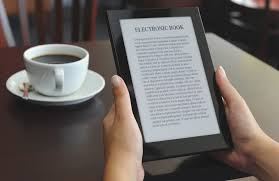Today I stumbled across the web site of a genealogy society I probably shouldn’t name. What caught my eye was a listing of ebooks of local records the society sells on CD-ROM disks. I started thinking, why don't more genealogy societies do the same? Even better, why don’t they sell the books online as ebooks?
A Challenge
 Does your genealogy society publish and sell printed books of local records of genealogy interest? If so, does your society also sell them as ebooks? If so, kudos to your society! If not, then I have to ask: "Why not?"
Does your genealogy society publish and sell printed books of local records of genealogy interest? If so, does your society also sell them as ebooks? If so, kudos to your society! If not, then I have to ask: "Why not?"
If your society is not selling ebooks, the result is lost sales and also not serving genealogists around the world who could benefit from the information in the society's publications!
One More Thing
Actually, I would make one additional suggestion to any genealogy society: sell the ebooks not only on CD-ROM disks but also as downloadable ebooks that the buyer can read within seconds after purchasing, all without requiring any additional labor by the society.
There are several benefits to the instant online sales:
1. Obviously, the customer receives better service. The ebook is available immediately without waiting for someone to receive the order, stuff a CD-ROM disk into an envelope, mail it, and then wait for the postal service or UPS to deliver it.
2. Many of today's laptop computers and more than a few desktop computers do not not include CD-ROM disk drives. (The desktop computer I am using at the moment to write this article is about 4 months old and does not include a CD-ROM disk drive.) Such drives are rapidly becoming obsolete. You could offer ebooks on flash drives, but even that is only a partial solution. For instance, are you going to use flash drives with the older USB connectors or the newer, smaller, high-speed USB-C connectors? Most of today's flash drives still use the older USB connectors, but the world is moving to the newer USB-C connectors. Publishing on flash drives with the older USB connectors almost guarantees that they will become obsolete within a few years (just like publishing on floppy disks).
Switching to downloadable files bypasses these hardware issues.
3. Accepting orders, creating CD-ROM disks (or flash drives), stuffing them into envelopes, and mailing the products is a waste of man-hours and money. Creating safe and secure online sales with credit card payments requires a bit of labor to create the order process. However, once created, using online sales will SAVE many man-hours over a period of time. Once customers can use this process to both order and receive your ebooks, you will likely see impressive reductions in expenses (buying CDs or flash drives) as well as labor (mailing them to buyers), not to mention postage. I suspect you may also see an increase in sales as well as traffic to your website.
Sales of downloadable ebooks can be accepted and fulfilled (product delivered) without anyone's involvement, even at 3 AM in your local time zone. The buyer then receives the ebook within seconds after making payment, regardless of the time of day. Even better, you can "farm out" the labor to a company that will handle all this for you, such as to Amazon, Lulu.com, Apple, or others.
For more information about having a company sell your ebooks for you with almost no labor required on your part, see 20 Websites to Sell and Publish Your eBooks at https://www.hongkiat.com/blog/websites-sell-publish-ebooks/ as well as the articles found by DuckDuckGo by starting at https://duckduckgo.com/?q=publish+books+online&atb=v132-2_j&ia=web.
COMMENT: Some people seem to think that placing genealogy information online means giving it away for free. Not so! If you or your society expended money, time, labor, and perhaps some materials in gathering and publishing the information, it is entirely reasonable to charge a modest fee to the genealogists who appreciate your labors. Even better, any revenue received can be used to pay the expenses of time, labor, and materials in gathering and publishing future information!
“If you are good at something, never do it for free” is the most famous dialogue from movie The Dark Knight.
With today's solutions of having a company sell your ebooks for you, the issues of collecting credit card payments becomes almost trivial. Simply sit back and let someone else do all the complicated stuff while you or your society only need to deposit the payments into a bank account. (Oh yes, the company that handles the online sales will even automatically deposit the money into your society’s bank account!).
Summation
In short, it's time to upgrade your society's publications to modern publishing formats. The result will be less labor required, lower expenses, more customers, and more distribution of the local information that is important to genealogists worldwide.
I'd call that a win-win-win-win solution.
 Latest News Articles
Latest News Articles If you do not see a Plus Sign that is labeled "Add comment," you will need to upgrade to either a (FREE) Standard Edition or a (paid) Plus Edition subscription
If you do not see a Plus Sign that is labeled "Add comment," you will need to upgrade to either a (FREE) Standard Edition or a (paid) Plus Edition subscription